Calls for Ukraine
Calls for Europe
Calls for USA
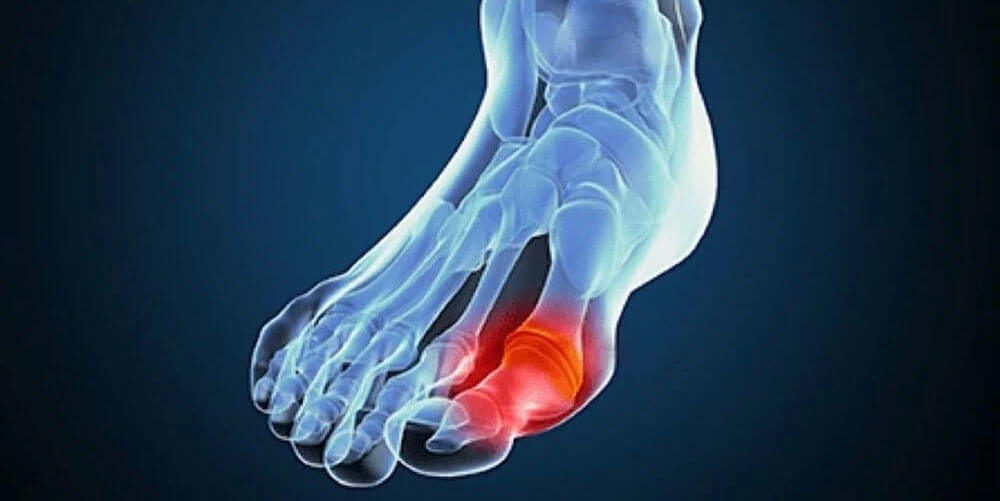
Gout is a fairly common metabolic disease, which is characterized by the deposition of uric acid salts in body tissues. Usually the disease is diagnosed in people older than 30-40 years. It appears more often in men and occurs with more severe symptoms. According to statistics, the number of people with gout ranges from 0.05-4% in different countries of the world. At the same time, the number of patients has been growing in recent decades.
As the disease progresses, more joints may be involved in the process. They are deformed, their mobility is limited, severe pain appears, which can significantly worsen the quality of human life. A common complication is also a violation of the kidneys. Therefore, it is very important to choose the right treatment for gout, which takes the condition under control. Medical coordinators of MedTour will help you choose a clinic and doctor who specialize in this disease and show high efficiency in its treatment.
This is a systemic disease in which there is a deposition of uric acid salts in the joints and other tissues of the body. There are characteristic gouty nodes – tophi. These are specific seals, which are deposits of uric acid in a crystalline form. As a rule, they form in the subcutaneous tissue near the joints, in the forehead, auricles, Achilles tendons and other places.
The joints of the hands and feet are predominantly affected, however, the development of a pathological process in the joints of the lower leg, elbows, and knees is also possible. Recurrent gouty arthritis develops. In this case, characteristic symptoms occur, the joints hurt, swell, gouty arthropathy is diagnosed with deformity and limitation of the joints.
Another danger of the disease is renal complications. With increased uric acid in the blood, kidney tissues are affected, kidney stones may be deposited, and urinary tract obstruction may occur. Over time, disturbances in the functioning of the kidneys can cause persistent arterial hypertension, renal failure.
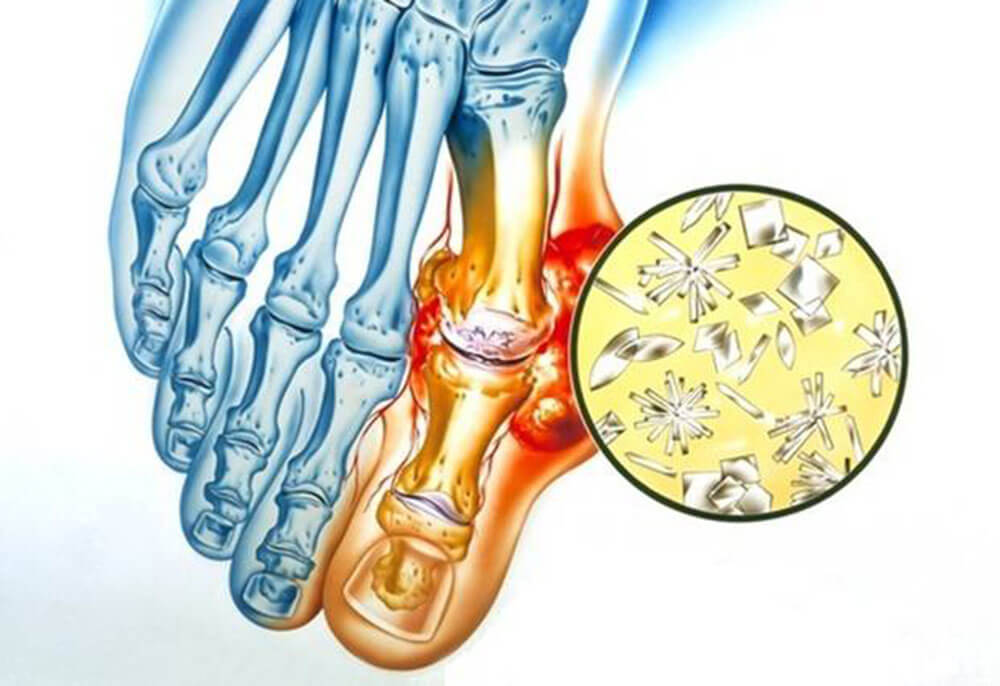
The main reason for the development of gout is hyperuricemia – an increase in the concentration of uric acid in the blood. Its excess crystallizes and is deposited in the tissues. Among the factors that provoke an increase in uric acid levels:
Factors that increase the risk of developing the disease include:
One of the main roles in the development of gout is nutrition. Indicators of the concentration of uric acid in the blood can increase markedly if a large amount of purine bases is present in the diet. Among the products that contain purine bases, meat and offal, some varieties of fish, peas, lentils, chocolate, alcohol, especially beer, cocoa, tea.
The main signs of gout disease are attacks of arthritis, which usually occur suddenly and last up to 7-10 days, and then the symptoms completely disappear for some period.
Typical symptoms that occur with gout:
During an acute attack, a symptom of the disease can also be fever, weakness, chills.
There are acute gout and chronic, primary and secondary. There are several stages, each of which is somewhat different in symptoms. Polyarthritis often develops when many joints are affected at the same time.
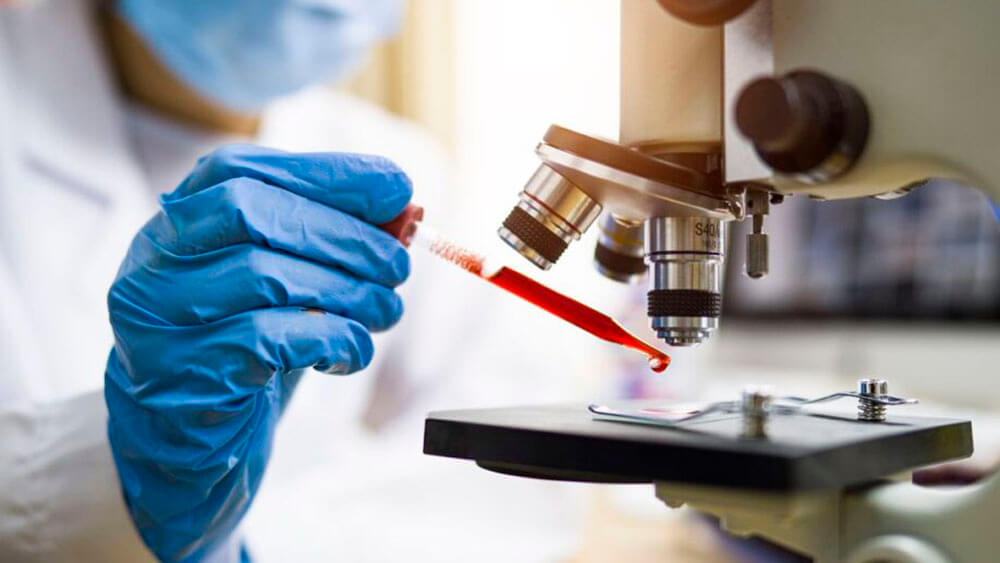
Diagnosis of the disease includes a number of examinations:
The following tests are a mandatory part of the diagnosis:
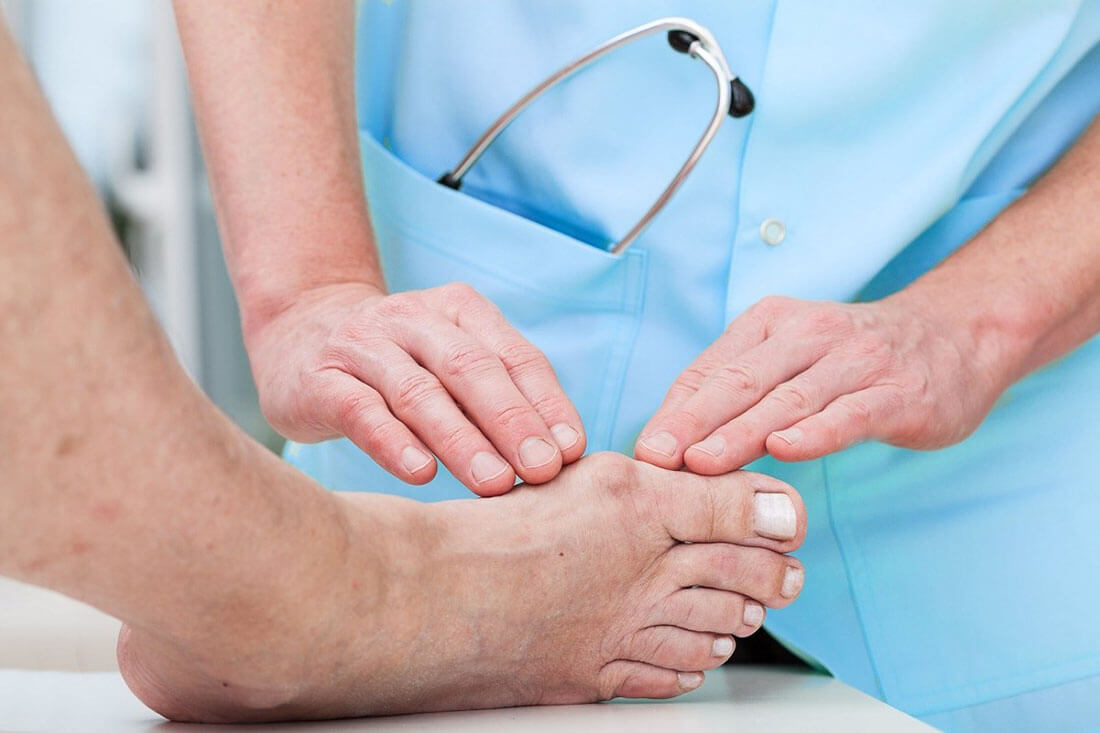
Therapy for this disease is aimed at normalizing the level of uric acid in the blood and removing the manifestations of arthritis. Treatments for gout usually include medication, dietary and lifestyle changes.
Drug treatment of gout is prescribed individually, taking into account the characteristics of the condition and stage of the disease. Anti-inflammatory and analgesic medications, drugs that reduce the level of uric acid and improve its excretion from the body, glucocorticosteroids can be used.
Diet therapy is essential for the prevention and treatment of gout. Nutrition correction for gout involves:
Also, the method of influencing the disease is physiotherapy, for example, electrophoresis, ultrasound treatment. In severe cases, the patient may be recommended surgical treatment. Separate attention is paid to the treatment of kidneys with gout, if they are included in the pathological process.
When treating an acute attack of gout, the first step is to relieve the pain. For this purpose, non-steroidal anti-inflammatory drugs, painkillers are used. The drugs can be taken in the form of tablets, as well as use ointments that have anti-inflammatory and analgesic effects.
It is also necessary to use special preparations of complex therapy in the treatment of an attack of gout, which will help to remove uric acid from the body.
At the moment, it is believed that it is impossible to completely cure gout. However, the patient can control the disease by maintaining normal levels of uric acid in the blood and preventing new attacks of acute arthritis.
Dieting, avoiding alcohol, maintaining a healthy lifestyle and properly selected treatment can improve the patient’s well-being. Unfortunately, traditional methods of treatment are not always enough to bring the condition under control. If metabolic disorders do not disappear and the body does not excrete uric acid in sufficient quantities, then some time after stopping the medication, the patient may again form crystals and resume seizures. Therefore, there is a constant search for new more effective methods of treatment and recommendations for the treatment of gout are constantly updated and supplemented.
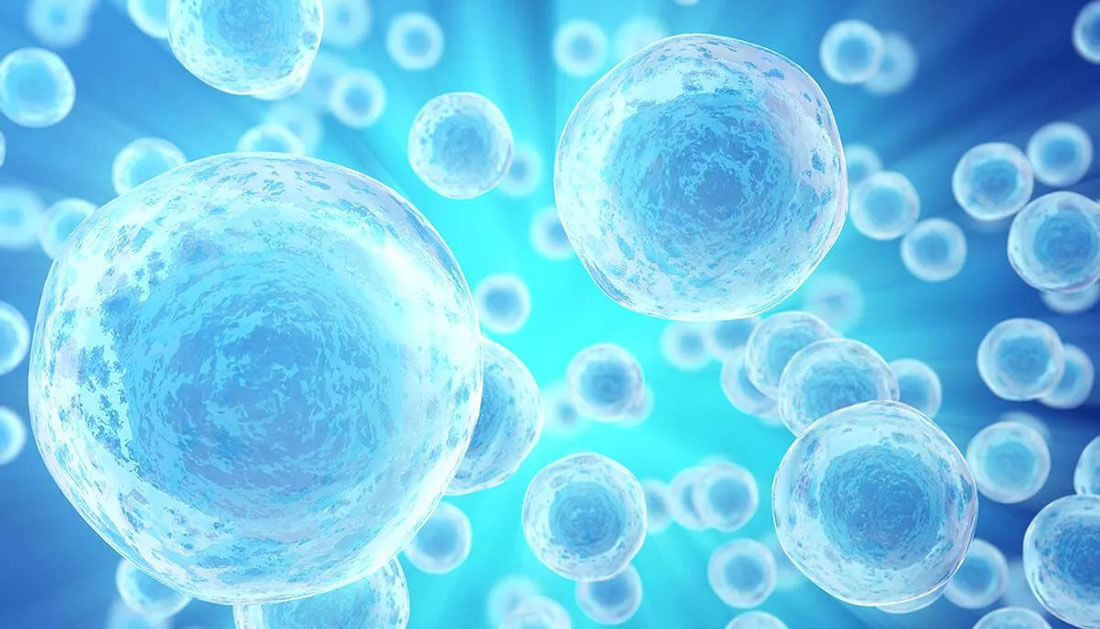
One promising new treatment for gout is stem cell therapy. These are progenitor cells that can develop into different types of cells. This cell type is responsible for self-renewal of the body. Modern medicine has learned to use their abilities in order to activate the regenerative capabilities of the body. Cell therapy is now offered by a number of clinics for the treatment of some complex diseases, including gout. Studies show that the use of stem cells is effective in about 80%.
For stem cell treatment:
The patient’s own cells or donor cells can be used for treatment. Mesenchymal stem cells are used, which are taken from adipose tissue or bone tissue.
After the cells are obtained in the laboratory, their number increases and special processing is carried out. Then the resulting drug is injected into the patient’s body. This may be an intravenous drip, or the drug may be injected directly into the diseased joint. One or more procedures are recommended, their number for each patient is personally determined by the doctor, depending on the characteristics of the condition.
Today, treatment for gout can be done in the best clinics in the world. Medical centers that specialize in the treatment of joints offer comprehensive, effective gout treatment using the latest methods. To get to the clinics that occupy a leading position in this field, you can contact us. Medical coordinators of MedTour will select the best options for you according to your needs.
If you want to undergo cell therapy treatment, we will help you choose a clinic that uses this type of therapy.
To treat gout, you need to see a rheumatologist. If renal manifestations occur, the help of a nephrologist may be required. Medical coordinators of MedTour will help you find the best doctors for this disease, consult on issues of interest, and tell you about all the nuances of a trip for treatment.
To learn more about the use of cell therapy, you can consult online with Dr. Andriy Kovalchuk, PhD, associate professor, specialist in the use of stem cells in various pathological conditions.
What happens if gout is not treated?
If you do not pay attention to gout, the general condition will worsen. Attacks accompanied by severe pain will intensify and become more frequent. More and more joints will be involved in the process. If the deposition of uric acid salts affects the kidneys, then large stones can form that interfere with the outflow of urine. Chronic renal failure may develop, against the background of the disease, problems may arise in the work of the cardiovascular system.
What can trigger a gout attack?
There are many factors that can trigger a gout attack. This is the abuse of foods rich in purines (alcohol, meat products, etc.), hypothermia, a small blow or injury to the joint, wearing rubbing shoes, and infectious diseases. A gout attack usually lasts 3-10 days.
How to know if there is a lot of uric acid in the body?
To find out the level of uric acid, you need to pass a special blood test. For this, blood is taken on an empty stomach from a vein. An increase in the concentration of uric acid in the body can be suspected by characteristic signs: if the joint begins to redden, swell, ache. Most often, the joint of the big toe suffers first. If such signs appear, you should immediately take an analysis for the level of uric acid.
Are there any side effects of stem cell treatment for gout?
Serious side effects were not registered. There may be slight redness at the injection site. Rarely (in 5% of cases) fever, fatigue may occur. But these discomforts go away on their own, usually within a few days.
Please rate the work of MedTour
